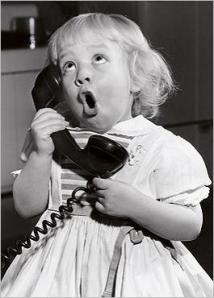 Lots of my students come to my lessons to improve their English so as to be able to get a job. What they often tell me is that they struggle especially when having to talk on the phone.
Lots of my students come to my lessons to improve their English so as to be able to get a job. What they often tell me is that they struggle especially when having to talk on the phone.
So this is the first of a series of posts that hopefully should help you feel more at ease during a phone conversation.
This is the scenario I’d like to present to you today: you saw an ad for a vacancy you might be interested in on a website or in a newspaper and you want to phone the advertiser to enquire about the position. You dial the number in the ad, someone picks up the phone and say something you don’t understand. You panic and hang up!!
How to avoid this? Read this post and find out!
STEP 1
The person you’re about to phone will probably say something along the lines of “Hi, Mary speaking, how can I help you?”
Here some possible answers:
“Hi, this is Soraya and I’d like to enquire about a vacancy advertised on the Guardian website.”
“Hi, I was calling to ask for more information about a position your company is advertising in the Daily Mail.”
STEP 2
Scenario 1.1: the person is just a receptionist and doesn’t know about this vacancy (she could say something like “I’m afraid I can’t help you as I don’t deal with applicants“) >> Don’t let this person put you off, say something!! For example..
“Okay, I see..Could I speak to the person in charge of the application process?”
and hopefully the receptionist will say “Okay, hold on please and I’ll put you through” (now they’ll put you on hold and you’ll probably have to listen to some annoying jingle)
eventually someone will pick up your call and say “Hi, this is Beth, how can I help you?”
and you say “Hi, this is Guido, I was calling to ask more information about one of your vacancies”.
>> go to STEP 3
Scenario 1.2: the company you’re calling is quite small and the person you’re talking to says:
“Yeah sure, could I first ask you which position you’re applying for as we have a few vacancies at the moment”
and you say “I’m applying for the position of account manager” >> go to STEP 3
STEP 3
Now this is the right time to ask for more information. Avoid direct questions (which sometimes sound rude, especially in British English), instead start your sentences by using expressions like “I was wondering whether..” , “Could you please tell me…”, “Could I ask you..”.
“I was wondering whether…..there is a deadline for applying”
“Could you please tell me/Could I ask you…..how many positions you are offering?
…. how I can apply?
…. a bit more about the selection process?
…who I should send my application form to?
…when interviews are being held?”
Notice that with indirect questions you don’t need to invert the subject and the verb. For example:
Could you tell me where is your office?
Could you tell me where your office is?
STEP 4
Don’t overload the speaker with many questions, just ask the ones that are important to you and remember to show appreciation for their help. Say something like “Sorry for keeping you so long, you’ve been very useful. Thank you and have nice day”.
Last but not least: don’t be afraid to ask someone to repeat if you didn’t understand what they said. Here some sentences you might want to use:
“Could you please repeat the last thing you said? I didn’t catch it”
“I’m sorry but reception is very bad, would you mind repeating that for me?” >> this is a good one as you can blame it on your phone reception (for those who don’t like to show they haven’t understood)
